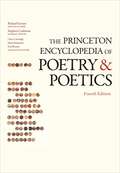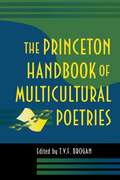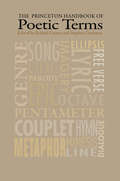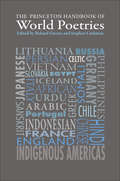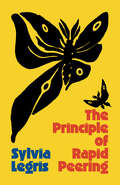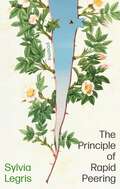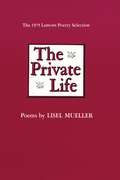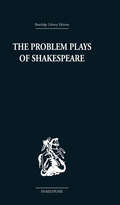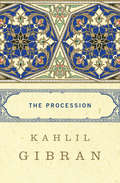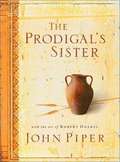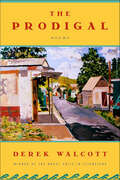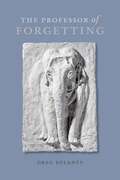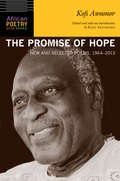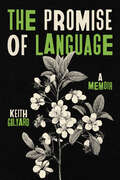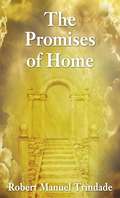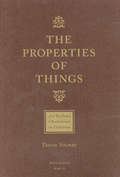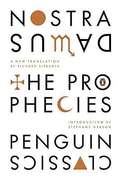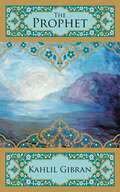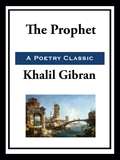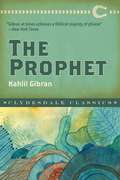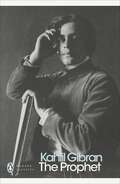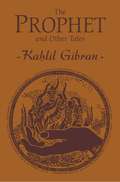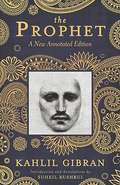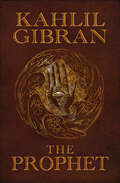- Table View
- List View
The Princeton Encyclopedia of Poetry and Poetics: Fourth Edition
by Roland GreeneThe most important poetry reference for more than four decades—now fully updated for the twenty-first century Through three editions over more than four decades, The Princeton Encyclopedia of Poetry and Poetics has built an unrivaled reputation as the most comprehensive and authoritative reference for students, scholars, and poets on all aspects of its subject: history, movements, genres, prosody, rhetorical devices, critical terms, and more. Now this landmark work has been thoroughly revised and updated for the twenty-first century. Compiled by an entirely new team of editors, the fourth edition—the first new edition in almost twenty years—reflects recent changes in literary and cultural studies, providing up-to-date coverage and giving greater attention to the international aspects of poetry, all while preserving the best of the previous volumes.At well over a million words and more than 1,000 entries, the Encyclopedia has unparalleled breadth and depth. Entries range in length from brief paragraphs to major essays of 15,000 words, offering a more thorough treatment—including expert synthesis and indispensable bibliographies—than conventional handbooks or dictionaries.This is a book that no reader or writer of poetry will want to be without.Thoroughly revised and updated by a new editorial team for twenty-first-century students, scholars, and poetsMore than 250 new entries cover recent terms, movements, and related topicsBroader international coverage includes articles on the poetries of more than 110 nations, regions, and languagesExpanded coverage of poetries of the non-Western and developing worldsUpdated bibliographies and cross-referencesNew, easier-to-use page designFully indexed for the first time
The Princeton Handbook of Multicultural Poetries
by T. V. F. BroganDrawn from the acclaimed New Princeton Encyclopedia of Poetry and Poetics, the articles in this concise new reference book provide a complete survey of the poetic history and practice in every major national literature or cultural tradition in the world. As with the parent volume, which has sold over 10,000 copies since it was first published in 1993, the intended audience is general readers, journalists, students, teachers, and researchers. The editor's principle of selection was balance, and his goal was to embrace in a structured and reasoned way the diversity of poetry as it is known across the globe today. In compiling material on 106 cultures in 92 national literatures, the book gives full coverage to Indo-European poetries (all the major Celtic, Slavic, Germanic, and Romance languages, as well as other obscure ones such as Hittite), the ancient middle Eastern poetries (Hebrew, Persian, Sumerian, and Assyro-Babylonian), subcontinental Indian poetries (the widest linguistic diversity), Asian and Pacific poetries (Chinese, Japanese, Korean, Vietnamese, Mongolian, and half a dozen others), continental American poetries (all the modern Western cultures and native Indian in North, Central, and South American regions), and African poetries (ancient and emergent, oral and written).
The Princeton Handbook of Poetic Terms: Third Edition
by Roland Greene Stephen CushmanThe Princeton Handbook of Poetic Terms--drawn from the latest edition of the acclaimed Princeton Encyclopedia of Poetry and Poetics--provides an authoritative guide to the most important terms in the study of poetry and literature. Featuring 226 fully revised and updated entries, including 100 that are new to this edition, the book offers clear and insightful definitions and discussions of critical concepts, genres, forms, movements, and poetic elements, followed by invaluable, up-to-date bibliographies that guide users to further reading and research. Because the entries are carefully selected and adapted from the Princeton Encyclopedia, the Handbook has unrivalled breadth and depth for a book of its kind, in a convenient, portable size. Fully indexed for the first time and complete with an introduction by the editors, this is an essential volume for all literature students, teachers, and researchers, as well as other readers and writers.Drawn from the latest edition of the acclaimed Princeton Encyclopedia of Poetry and PoeticsProvides 226 fully updated and authoritative entries, including 100 new to this edition, written by an international team of leading scholarsFeatures entries on critical concepts (canon, mimesis, prosody, syntax); genres, forms, and movements (ballad, blank verse, confessional poetry, ode); and terms (apostrophe, hypotaxis and parataxis, meter, tone)Includes an introduction, bibliographies, cross-references, and a full index
The Princeton Handbook of World Poetries
by Roland Greene Stephen CushmanThe Princeton Handbook of World Poetries--drawn from the latest edition of the acclaimed Princeton Encyclopedia of Poetry and Poetics--provides a comprehensive and authoritative survey of the history and practice of poetry in more than 100 major regional, national, and diasporic literatures and language traditions around the globe. With more than 165 entries, the book combines broad overviews and focused accounts to give extensive coverage of poetic traditions throughout the world. For students, teachers, researchers, poets, and other readers, it supplies a one-of-a-kind resource, offering in-depth treatment of Indo-European poetries (all the major Celtic, Slavic, Germanic, and Romance languages, and others); ancient Middle Eastern poetries (Hebrew, Persian, Sumerian, and Assyro-Babylonian); subcontinental Indian poetries (Bengali, Hindi, Marathi, Punjabi, Sanskrit, Tamil, Urdu, and more); Asian and Pacific poetries (Chinese, Japanese, Korean, Vietnamese, Mongolian, Nepalese, Thai, and Tibetan); Spanish American poetries (those of Mexico, Peru, Argentina, Chile, and many other Latin American countries); indigenous American poetries (Guaraní, Inuit, and Navajo); and African poetries (those of Ethiopia, Somalia, South Africa, and other countries, and including African languages, English, French, and Portuguese). Complete with an introduction by the editors, this is an essential volume for anyone interested in understanding poetry in an international context.Drawn from the latest edition of the acclaimed Princeton Encyclopedia of Poetry and PoeticsProvides more than 165 authoritative entries on poetry in more than 100 regional, national, and diasporic literatures and language traditions throughout the worldFeatures extensive coverage of non-Western poetic traditionsIncludes an introduction, bibliographies, cross-references, and a general index
The Principle of Rapid Peering
by Sylvia LegrisA lyrical guide through Saskatchewan’s Aspen Parkland by a poet whose work is “fizzing with ecological intellect” (Times Literary Supplement). Self-seeding wind is a wind of ever-replenishing breath. —from “The Walk, or The Principle of Rapid Peering” The title of Sylvia Legris’ melopoeic collection The Principle of Rapid Peering comes from a phrase the nineteenth-century ornithologist and field biologist Joseph Grinnell used to describe the feeding behavior of certain birds. Rather than waiting passively for food to approach them, these birds live in a continuous mode of “rapid peering.” Legris explores this rich theme of active observation through a spray of poems that together form a kind of almanac or naturalist’s notebook in verse. Here is “where nature converges with words,” as the poet walks through prairie habitats near her home in Saskatchewan, through lawless chronologies and mellifluous strophes of strobili and solstice. Moths appear frequently, as do birds and plants and larvae, all meticulously observed and documented with an oblique sense of the pandemic marking the seasons. Elements of weather, ornithology, entomology, and anatomy feed her condensed, inflective lines, making the heart bloom and the intellect dance.
The Principle of Rapid Peering
by Sylvia LegrisSelf-seeding windis a wind of ever-replenishing breath.-from 'The Walk, or The Principle of Rapid Peering'The title of Sylvia Legris' melopoeic collection The Principle of Rapid Peering comes from a phrase the nineteenth-century ornithologist and field biologist Joseph Grinnell used to describe the feeding behaviour of certain birds. Rather than waiting passively for food to approach them, these birds live in a continuous mode of 'rapid peering'. Legris explores this rich theme of active observation through a spray of poems that together form a kind of almanac or naturalist's notebook in verse. Here is 'where nature converges with words,' as the poet walks through prairie habitats near her home in Saskatchewan, through lawless chronologies and mellifluous strophes of strobili and solstice. Moths appear frequently, as do birds and plants and larvae, all meticulously observed and documented with an oblique sense of the pandemic marking the seasons. Elements of weather, ornithology, entomology, and anatomy feed her condensed, inflective lines, making the heart bloom and the intellect dance.Features drawings by the poet.
The Private Life: Poems
by Lisel Mueller“Lisel Mueller’s poems are deeply felt and give pleasure because of their truth conveyed in sensuous terms. I found myself earmarking numbers of poems because they were compelling, satisfying, each a thing in itself.”—Richard Eberhart The forty-three poems in this award winning collection by Lisel Mueller are written with a sense of history, an awareness of the inescapable changes taking place in our century and the effect on how we see our lives. Each of the poems speaks from a separate moment of experience. Each of them in its own way, celebrates the autonomy of the self, the mysteries of intimacy, growth, and feeling, and the struggle against what one writer has called the “ongoing assault from without to be something palpable and identifiable.”
The Problem Plays of Shakespeare: A Study of Julius Caesar, Measure for Measure, Antony and Cleopatra
by Ernest SchanzerThe opening chapter traces the history of the term 'problem plays' as applied to Shakespeare and defines it more clearly and precisely than has been done in the past. Julius Caesar, Measure for Measure, Antony and Cleopatra are then discussed in separate chapters, not only as problem plays but from various points of view: such matters as themes, structural pattern, character-problems, the play's relation to its sources as well as to other plays in the canon, are all touched upon.
The Procession
by Kahlil GibranA collection of poetry by Kahlil Gibran, Eastern literature&’s most prolific thinker and the author of The Prophet, one of the most renowned books of the last century. Kahlil Gibran&’s reflections on the wistful beauty, lofty majesty, and abiding peace of Eastern wisdom revolutionized Arab literature. This collection of dramatic poems uses the dialogue between age and youth as a platform to discuss deep subjects such as freedom, death, and the eternal soul. From &“Of Life and Sorrow&” to &“Of Science and Knowledge,&” Gibran&’s vision transcends boundaries of religion and culture, finding beauty and wisdom in the universal struggles of everyday life.
The Prodigal's Sister
by John PiperThe Grace of God is so astonishing that we cannot adequately describe it. But Jesus knew how to say it in a parable. With the drawings of Robert Doares depicting the setting, The Prodigal's Sister poetically and imaginatively retells the parable of the prodigal son with a startling twist. In the poem the younger sister of the prodigal sets out to reclaim her brother's life. The new life the prodigal finds in his father's love is mirrored in the mercy the legalistic elder brother finds when he learns that his slave-like labor is useless in winning his father's love. The Prodigal's Sister, which the author reads on the accompanying CD, rejoices over the incomparable grace of God. For anyone who has ever felt beyond the hope of joy, this poem opens a way home to the Father.
The Prodigal: Poems
by Derek WalcottNobel Laureate Derek Walcott's The Prodigal is a journey through physical and mental landscapes, from Greenwich Village to the Alps, Pescara to Milan, Germany to Cartagena.But always in "the music of memory, water," abides St. Lucia, the author's birthplace, and the living sea. In this book of poems, Derek Walcott has created a sweeping yet intimate epic of an exhausted Europe studded with church spires and mountains, train stations and statuary, where the New World is an idea, a "wavering map," and where History subsumes the natural history of his "unimportantly beautiful" island home. Here, the wanderer fears that he has been tainted by his exile, that his life has become untranslatable, and that his craft itself is rooted in betrayal of the vivid archipelago to which, like Antaeus, he must return for the very sustenance of life.
The Professor of Forgetting
by Greg DelantyThe Professor of Forgetting, a new collection from the acclaimed Irish poet Greg Delanty, swings back and forth on the fulcrum of what we call “now” and confronts our notion of how time passes. From the very first poem, “Going Nowhere Fast,” which ponders whether we are now here or going nowhere, to the final selection, from which the book takes its self-reflective title, these exuberant poems chronicle what it means to be human with joy, pathos, honesty, despair, sorrow, celebration, and wit. Structurally diverse in form, the poems also explore a range of poignant topics, including childhood, family, love, racism, the natural world, immigration, and the unavoidability of death. Often humorous, Delanty’s poetry finds ways of coping with the challenges of life, as it makes lasting art out of heartbreaking difficulty and experience.
The Promise of Hope: New and Selected Poems, 1964-2013 (African Poetry Book)
by Kwame Dawes Kofi Awoonor Kofi AnyidohoKofi Awoonor, one of Ghana’s most accomplished poets, had for almost half a century committed himself to teaching, political engagement, and the literary arts. The one constant that guided and shaped his many occupations and roles in life was poetry. The Promise of Hope is a beautifully edited collection of some of Awoonor’s most arresting work spanning almost fifty years. Selected and edited by Awoonor’s friend and colleague Kofi Anyidoho, himself a prominent poet and academic in Ghana, The Promise of Hope contains much of Awoonor’s most recent unpublished poetry, along with many of his anthologized and classic poems. This engaging volume serves as a fitting contribution to the inaugural cohort of books in the African Poetry Book Series.
The Promise of Language: A Memoir (African American Life)
by Keith GilyardRecounting a life—and language—by an esteemed scholar of African American rhetoric. In this powerful coming-of-age memoir, author, scholar, and linguist Keith Gilyard presents a testament to the transformative power of language. From his earliest days in the segregated New York City public schools of the 1950s and '60s through his ascent in academia, the rhythm of Black America's vernacular and music provides the backdrop to Gilyard's intellectual awakening. He absorbed language through music, television, and radio, recognizing early on that his mother was a "language chameleon," a woman from Georgia who never sounded Black southern. His journey intertwines personal growth with the multiplicity of language and the sociopolitical upheavals of the Cold War era and the Civil Rights, Black Power, and Black Arts movements. Through vibrant anecdotes and introspection, Gilyard brings his experiences and realizations to life from memories of barbershops, churches, and schools, to lessons from mentors and influencers like Ed Bullins, Sonia Sanchez, Don L. Lee (later Haki Madhubuti), Toni Morrison, and Paule Marshall. Each encounter brings clarity and a new lens through which to understand the world, revealing how language shapes our lives and how our lives are shaped by language.
The Promises of Home
by Robert Manuel TrindadeThose who are in the family of Christ are given the promises of God. There are many things guaranteed by God, but His greatest gifts of love are given to those whose faith is in Him. Even for the children of God, Scripture has promised both good and bad things, but His promises of love are seen in history with fulfillment of past promises and some we're still waiting for. The written word of God is for building our faith in what He's promised, and it tells of the future we look forward to.
The Properties of Things
by David SolwayThe Properties of Things continues David Solway's explorations in the realm of fictive translation, this time that of the obscure thirteenth century scholar Bartolomaeus Anglicus. The result is a poetic alphabetary, ranging from the bawdy to the sublime.David Solway has been called "an internationalist of the imagination." He remains one of the country's most brilliant and inventive poets.
The Prophecies
by Richard Sieburth Nostradamus Stephane GersonIn time for the end of the world: the first major literary presentation of Nostradamus's Prophecies, newly translated and edited by prizewinning scholars The mysterious quatrains of the sixteenth-century French astrologer Nostradamus have long proved captivating for their predictions. Nostradamus has been credited with anticipating the Great Fire of London, the rise of Adolf Hitler, and the September 11 terrorist attacks. Today, as the world grapples with financial meltdowns, global terrorism, and environmental disasters--as well as the Mayan prediction of the apocalypse on December 21, 2012--his prophecies of doom have assumed heightened relevance. How has The Prophecies outlasted most books from the Renaissance? This edition considers its legacy in terms of the poetics of the quatrains, published here in a brilliant new translation and with introductory material and notes mapping the cultural, political, and historical forces that resonate throughout Nostradamus's epic, giving it its visionary power.
The Prophecies: A Dual-Language Edition with Parallel Text
by Richard Sieburth Nostradamus Stephane GersonThe first major literary presentation of Nostradamus's Prophecies, newly translated and edited by prizewinning scholars The mysterious quatrains of the sixteenth-century French astrologer Nostradamus have long proved captivating for their predictions. Nostradamus has been credited with anticipating the Great Fire of London, the rise of Adolf Hitler, and the September 11 terrorist attacks. Today, as the world grapples with financial meltdowns, global terrorism, and environmental disasters—as well as the Mayan prediction of the apocalypse on December 21, 2012—his prophecies of doom have assumed heightened relevance. How has The Prophecies outlasted most books from the Renaissance? This edition considers its legacy in terms of the poetics of the quatrains, published here in a brilliant new translation and with introductory material and notes mapping the cultural, political, and historical forces that resonate throughout Nostradamus's epic, giving it its visionary power.From the Hardcover edition.
The Prophet
by Kahlil GibranAlmustafa, the chosen and the beloved, who was a dawn unto his own day, had waited twelve years in the city of Orphalese for his ship that was to return and bear him back to the isle of his birth.And in the twelfth year, on the seventh day of Ielool, the month of reaping, he climbed the hill without the city walls and look seaward; and he beheld his ship coming with the mist.Then the gates of his heart were flung open, and his joy flew far over the sea. And he closed his eyes and prayed in the silences of his soul. So begins The Prophet, Kahlil Gibran&’s collection of twenty-eight prose poems on the themes of love, marriage, joy and sorrow, reason and passion, freedom, beauty, death—the essence of what we define as the human condition. Profound in its spirituality and elegant in its telling, Gibran&’s masterwork has sold millions of copies since it was first published in 1923 and is admired around the world for its wisdom and philosophical insights. This edition features twelve illustrations drawn by the author to accompany his inspirational text.
The Prophet
by Khail GilbranThe Prophet' is a truly ground breaking inspirational book of poetry consisting of a series of prose poems. Each poem discussing an important aspect of the human condition such as love, death, friendship, and good and evil. Gibran&’s insights into the human condition are considerable and inspiring. Truly a book for the ages. 'The Prophet' has sold more than ten million copies and been translated into more than one hundred languages. A timeless classic.
The Prophet (Clydesdale Classics)
by Kahlil GibranKahlil Gibran’s The Prophet is considered one of the greatest classics of our time. The collection of twenty-six beautiful and intriguing essays cover a comprehensive variety of subjects including: Love and relationshipsFamily and marriageCrime and punishmentJoy and sorrowFreedomPleasureReligion and prayerAnd many, many more! These poetic essays delve into the workings and passions of the human mind, exploring what makes us human and what controls our most basic instincts of the mind and deepest impulses of the heart. For the past century, the lines and verses from these captivating essays have inspired musicians, politicians, and influential figures from across the globe, including The Beatles, Ronald Reagan, and Indira Gandhi. Audiences of all beliefs and mindsets can find pleasure and inspiration from the dogma-free essay collection. With the original text and illustrations by Gibran himself, let yourself be inspired by the new edition of The Prophet.
The Prophet (Penguin Modern Classics)
by Kahlil GibranA hugely influential philosophical work of prose poetry, Kahlil Gibran's The Prophet is an inspirational, allegorical guide to living, and this Penguin Modern Classics edition includes an introduction by Robin Waterfield.First published in the 1920's, The Prophet is perhaps the most famous work of religious fiction of the twentieth century, and has sold millions of copies in more than twenty languages. Gibran's Prophet speaks of many things central to daily life: love, marriage, death, beauty, passion, eating, work and play. The spiritual message he imparts, of finding divinity through love, blends eastern mysticism, religious faith and philosophy with simple advice. The Prophet became the bible of 1960s culture and was credited with founding the New Age movement, yet it still continues to inspire people around the world today. This edition is illustrated with Gibran's famous visionary paintings.Kahlil Gibran (1883-1931) was a poet, philosopher and artist, who stands among the most important Arabic language authors of the early twentieth century. Born in Lebanon, he spent the last twenty years of his life in the United States, where for many years he was the leader of a Lebansese writing circle in New York. He is the author of numerous volumes, including The Garden of the Prophet, The Storm, The Beloved: Reflections on the Path of the Heart, The Vision, Reflections on the Way of the Soul, and Spirit Brides. If you enjoyed The Prophet, you might like Herman Hesse's Siddhartha, also available in Penguin Modern Classics.'His work goes on from generation to generation'Daily Mail'To read it was to transcend ordinary levels of perception, to become aware ... of a more intense level of being'Independent
The Prophet and Other Tales (Wordsworth Classics)
by Kahlil GibranThis classical work of philosophy has inspired readers around the world for generations. Upon its initial publication in 1923, Kahlil Gibran’s The Prophet garnered little acclaim, but it became a critical success in the 1930s and again in the 1960s when it inspired a generation of readers with its philosophical discussion on subjects such as love, friendship, beauty, and freedom. Gibran’s masterpiece of poetic prose has now been translated into more than a hundred languages, and is regarded as one of the most important works of the early twentieth century. This Word Cloud edition of The Prophet and Other Tales also includes two of Gibran’s earliest works, The Madman and The Forerunner, along with illustrations by the author.
The Prophet: A New Annotated Edition
by Kahlil Gibran Suheil BushruiOriginally published in 1923, The Prophet continues to inspire millions worldwide with its timeless words of love and mystical longing. Writing with insight, hope, and a remarkable compassion for the human condition, Kahlil Gibran explores ideas of joy and sorrow, friendship, good and evil, pleasure, reason and passion, expressing humanity's yearning for a Unity of Being, only achieved through love.Introduced and annotated throughout by world expert Suheil Bushrui, this revised and updated edition is a truly enlightening experience for anyone seeking solace and wisdom in the chaotic modern age.
The Prophet: Large Print (Clydesdale Classics Ser.)
by Kahlil GibranRich in timeless wisdom and beautiful poetic language, this spiritual classic is &“exquisite . . . simply a masterpiece&” (The Independent, London). As the wise man Almustafa prepares to leave the island where he has lived in exile from his home for twelve years, the community gathers around him, beseeching him to share his wisdom before he departs. Within this framework, the beloved prophet offers meditations on love, marriage, children, giving, eating and drinking, work, joy and sorrow, houses, clothes, buying and selling, crime and punishment, laws, freedom, reason and passion, pain, self-knowledge, teaching, friendship, talking, time, good and evil, prayer, pleasure, beauty, religion, and death. Written by a Lebanese-American poet, The Prophet was an immediate success upon its publication in 1923. Translated into more than one hundred languages and selling millions of copies, the book&’s popularity has never waned. In the 1960s, it was freshly discovered and venerated by the counterculture, and in 2014, it was adapted into an animated film. The universal truths embedded in these twenty-six prose poems continue to resonate for spiritual seekers. This ebook has been professionally proofread to ensure accuracy and readability on all devices.
